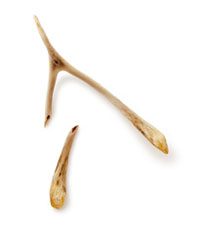It was a marriage made on a pully-bone. Rick Warwick told me about it, and Bernie Deal backed him up, so I guess it’s true.
It seems there were two maiden sisters named Carey and Frankie Paul who lived up on Parker Branch near Leiper’s Fork. Frankie was a “tall and handsome woman,” according to Bernie; Carey was a little less so. This was back in the 1940s when the roads were still dirt and there was not much local industry beyond sawmilling and farming and cooking up corn, and young ladies didn’t get out very much.
 Frankie and Carey were the daughters of Turley Paul who, despite being blind in one eye, was one of the finest carpenters in the county. Bernie says that in his later years Turley would walk up and down the Leiper’s Fork roads with his hands clasped behind his back, looking closely at every house he saw. He would pause and tilt his head back and forth like a bird to get a good one-eyed perspective, and then he would approach whoever was at home and advise him that something about his house wasn’t constructed quite right. It made no difference to Turley Paul that the house might have been that way for decades. He had a serious sense of what was right and what wasn’t in matters of carpentry.
Frankie and Carey were the daughters of Turley Paul who, despite being blind in one eye, was one of the finest carpenters in the county. Bernie says that in his later years Turley would walk up and down the Leiper’s Fork roads with his hands clasped behind his back, looking closely at every house he saw. He would pause and tilt his head back and forth like a bird to get a good one-eyed perspective, and then he would approach whoever was at home and advise him that something about his house wasn’t constructed quite right. It made no difference to Turley Paul that the house might have been that way for decades. He had a serious sense of what was right and what wasn’t in matters of carpentry.
Well, there was another, less accomplished carpenter in town named Joe Gooch. Gooch lived in a house he had built down by the creek right outside of Leiper’s Fork. Turley didn’t have much use for Mr. Gooch, but his daughters did—Mr. Gooch was about the only man in town who was single and had steady work. Turley thought Gooch was lazy and imprecise in matters of carpentry, which he considered a failing of character, but as much as he resisted the idea, Turley eventually had to face the fact that Mr. Gooch provided the only promising opportunity for one of his daughters to marry and live comfortably. The problem was, he had two daughters and there was only one Mr. Gooch.
The girls would see Mr. Gooch at the market in Leiper’s Fork and at church, and they would sometimes socialize with him on Sunday afternoons or after Wednesday-night prayer meeting. Still, you couldn’t really say there was any actual courting going on. Work was about all Mr. Gooch had a serious interest in. Besides, he was a private and modest man who wasn’t one to be forward with women. But as time passed the subject of marriage began to come up, and eventually Frankie and Carey and Mr. Gooch began talking about it openly.
In his quiet way, Mr. Gooch didn’t have much to say about his inclinations toward matrimony, except to point out the obvious fact that he couldn’t marry both girls. He didn’t have any other suggestions. He wouldn’t even say which of the girls he preferred since he didn’t want to hurt either one’s feelings.
So a stalemate set in and lasted for quite some time. All the neighbors had their suggestions and speculations. Some looked to the almanac for signs and some tried to charm chance, but the signs were silent and chance didn’t reveal itself either. The neighbors didn’t joke or bet on the outcome, as they might have if a horse race or a fist fight had been involved: this was a problem involving friends and close kinships. A serious matter.
 When the solution to the impasse finally appeared, no one could say exactly where it had come from or who had suggested it. It was as though it had been there all along but had only revealed itself when the neighbors’ thinking had matured enough to be able to recognize it.
When the solution to the impasse finally appeared, no one could say exactly where it had come from or who had suggested it. It was as though it had been there all along but had only revealed itself when the neighbors’ thinking had matured enough to be able to recognize it.
The solution was a pully-bone snap. Everybody had been snapping bones at Sunday dinner since they were kids, so people figured that Frankie and Carey were proficient in it and would be pretty evenly matched. That was probably true, but rumors soon spread that the girls had begun studying up on it, and practicing, and that one of them had even traveled over to Flat Creek to learn from an expert. Some thought they might be trying to improve their chances of winning, while others thought just the opposite. But those were just rumors. All people really knew was that the contest was to be a single-shot, under-the-table, winner-take-all pull.
A proper bone was supplied by an unidentified chicken farmer, cooked and stripped and ready, and unexamined by either side. On the appointed day, the girls and their father, along with several attesting witnesses, gathered in Mr. Gooch’s kitchen. Turley had invited the pastor from the Hillsboro Church of Christ to attend and lend the contest some Christian blessing, but the preacher never showed up. The preacher’s absence disturbed Turley a little since he knew as well as the preacher did that the Bible, even in its most liberal interpretation, probably frowned on gambling over matrimony.
Without any conversation or delay, the girls sat down on opposite sides of Mr. Gooch’s table. Then they reached down and placed their hands underneath the table where they could not see them. Then one of the attending neighbors placed a leg of the freshly stripped bone in each one’s hand, and Turley Paul said “Go!” There was a sharp snap from under the table, and Carey straightened up holding the long end of the bone. A brief intake of breath rustled the room as the neighbors watched Carey stare in wonder at the jagged end of the bone. Everyone knew that she had won.
No one seems to have recorded how Carey took the news that she had won, or how Frankie felt about losing. Mr. Gooch didn’t seem to care, and Turley Paul had resigned himself to whatever the outcome might be. So I guess most of them were satisfied.
I asked Rick what became of these people in their later years, before they all grew old and passed into history. He said that Frankie, the handsome one, never got married, though as Bernie added, “It warn’t for lack of tryin’.” There’s many a story, they say, about Frankie’s later adventures in search of a husband, but it seems she died single—if not necessarily an old maid.
And there the matter rests.

Copyright (c) 2015 by Wayne Christeson. All rights reserved. Chapter 16‘s copyeditor, Wayne Christeson is a Vanderbilt graduate and a retired attorney who has lived on a farm in Leiper’s Fork, Tennessee, for twenty-five years. His work has appeared in Vanderbilt Magazine, Nashville Arts, and the Nashville Scene, among other publications.





